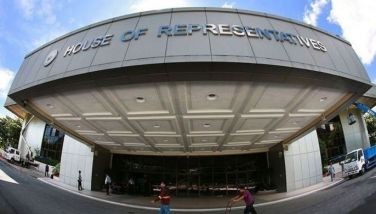Lawmaker files anti-SARS measure in House
April 25, 2003 | 12:00am
A bill to combat Severe Acute Respiratory Syndrome was filed yesterday at the House of Representatives requiring all possible SARS-infected persons or carriers to undergo mandatory quarantine.
It seeks to impose fines on persons who knowingly conceal symptoms of the viral illness or mislead authorities about the disease they may be carrying.
House Bill No. 5937, authored by Negros Occidental Rep. Jose Apolinario Lozada, requires all persons traveling to the Philippines to truthfully answer all questions asked by health authorities and all questionnaires given by quarantine officials to determine if they are infected with, or are carriers of, the SARS-causing coronavirus and other highly contagious diseases.
It also seeks to fine any person who knowingly conceals information when answering questions and questionnaires from the proper authorities. The proposed fine is no less than P60,000 and no more than P100,000.
Foreigners who refuse to undergo mandatory quarantine despite showing symptoms of SARS and other communicable diseases may be refused entry or be immediately deported.
Under the bill, all doctors, nurses and other healthcare practitioners are tasked to render the appropriate services to prevent the spread of quarantinable diseases in case of any actual or threatened outbreak.
It also mandates the proper authorities to disseminate information to the public on precautionary measures against quarantinable diseases and other relevant information on these ailments to prevent misinformation and demoralization caused by lack of accurate data.
The Department of Health (DOH) will be the lead agency in implementing the bill once it is passed into law. Under the bill, the DOH will prioritize programs to prevent the spread of quarantinable diseases.
Lozada said Speaker Jose de Venecia Jr. is supportive of the bill and has tabled it for discussion on the floor Monday.
Meanwhile, Health Secretary Manuel Dayrit pushed for the amendment of Republic Act 123, the Quarantine Law of 1947.
Dayrit said the DOH is working with Congress for President Arroyo to certify as urgent any bill amending the quarantine law.
Under RA 123, a person can be quarantined for the purpose of preventing the spread of quarantinable diseases, but this is subject to the recommendation of the "Secretary of Health and Public Welfare."
Bureau of Quarantine (BOQ) deputy director Dr. Jesus Abella said RA 123 is no longer attuned to the times, considering that such a post no longer exists, though the law created the BOQ.
Dayrit said that if the Filipino people would only have a "sense of risk," there would be no need for enforced quarantine. "All we need is cooperation. If it’s gonna be a cat-and-mouse game and I told you to go on quarantine and you say ‘yeah, the heck, I don’t want to be quarantined,’ (nothing will happen)."
Muntinlupa Rep. Rufino Biazon asked House members to allocate P200,000 from their Priority Development Fund (PDF) and wants senators to put up P500,000 for the DOH’s SARS-related operations.
Biazon said there is a need to pool funds to boost the facilities and capabilities of the Research Institute for Tropical Medicine (RITM) in Alabang, Muntinlupa City and San Lazaro Hospital (SLH) in Manila. RITM and SLH, which specialize in treating communicable diseases, are treating suspected SARS cases.
Davao City Rep. Prospero Nograles recommended tighter restrictions on meat imports to prevent the entry of SARS.
Sen. Manuel Villar Jr. has urged Alcala, Pangasinan town officials to pass an ordinance imposing forced quarantines on three of its villages to prevent the spread of SARS.
Villar cited Section 447 of the Local Government Code of 1991, which empowers a municipality’s sanggunian bayan "to adopt quarantine regulations to prevent the introduction and spread of disease."
He wants Alcala town officials to enact an ordinance requiring barangay tanods to engage in an intensive information drive on SARS. – With Sheila Crisostomo
It seeks to impose fines on persons who knowingly conceal symptoms of the viral illness or mislead authorities about the disease they may be carrying.
House Bill No. 5937, authored by Negros Occidental Rep. Jose Apolinario Lozada, requires all persons traveling to the Philippines to truthfully answer all questions asked by health authorities and all questionnaires given by quarantine officials to determine if they are infected with, or are carriers of, the SARS-causing coronavirus and other highly contagious diseases.
It also seeks to fine any person who knowingly conceals information when answering questions and questionnaires from the proper authorities. The proposed fine is no less than P60,000 and no more than P100,000.
Foreigners who refuse to undergo mandatory quarantine despite showing symptoms of SARS and other communicable diseases may be refused entry or be immediately deported.
Under the bill, all doctors, nurses and other healthcare practitioners are tasked to render the appropriate services to prevent the spread of quarantinable diseases in case of any actual or threatened outbreak.
It also mandates the proper authorities to disseminate information to the public on precautionary measures against quarantinable diseases and other relevant information on these ailments to prevent misinformation and demoralization caused by lack of accurate data.
The Department of Health (DOH) will be the lead agency in implementing the bill once it is passed into law. Under the bill, the DOH will prioritize programs to prevent the spread of quarantinable diseases.
Lozada said Speaker Jose de Venecia Jr. is supportive of the bill and has tabled it for discussion on the floor Monday.
Meanwhile, Health Secretary Manuel Dayrit pushed for the amendment of Republic Act 123, the Quarantine Law of 1947.
Dayrit said the DOH is working with Congress for President Arroyo to certify as urgent any bill amending the quarantine law.
Under RA 123, a person can be quarantined for the purpose of preventing the spread of quarantinable diseases, but this is subject to the recommendation of the "Secretary of Health and Public Welfare."
Bureau of Quarantine (BOQ) deputy director Dr. Jesus Abella said RA 123 is no longer attuned to the times, considering that such a post no longer exists, though the law created the BOQ.
Dayrit said that if the Filipino people would only have a "sense of risk," there would be no need for enforced quarantine. "All we need is cooperation. If it’s gonna be a cat-and-mouse game and I told you to go on quarantine and you say ‘yeah, the heck, I don’t want to be quarantined,’ (nothing will happen)."
Muntinlupa Rep. Rufino Biazon asked House members to allocate P200,000 from their Priority Development Fund (PDF) and wants senators to put up P500,000 for the DOH’s SARS-related operations.
Biazon said there is a need to pool funds to boost the facilities and capabilities of the Research Institute for Tropical Medicine (RITM) in Alabang, Muntinlupa City and San Lazaro Hospital (SLH) in Manila. RITM and SLH, which specialize in treating communicable diseases, are treating suspected SARS cases.
Davao City Rep. Prospero Nograles recommended tighter restrictions on meat imports to prevent the entry of SARS.
Sen. Manuel Villar Jr. has urged Alcala, Pangasinan town officials to pass an ordinance imposing forced quarantines on three of its villages to prevent the spread of SARS.
Villar cited Section 447 of the Local Government Code of 1991, which empowers a municipality’s sanggunian bayan "to adopt quarantine regulations to prevent the introduction and spread of disease."
He wants Alcala town officials to enact an ordinance requiring barangay tanods to engage in an intensive information drive on SARS. – With Sheila Crisostomo
BrandSpace Articles
<
>
- Latest
- Trending
Trending
Latest
Trending
Latest
Recommended
February 20, 2025 - 12:00am



























